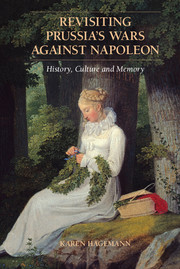Book contents
- Frontmatter
- Epigraph
- Contents
- List of Figures and Maps
- List of Abbreviations
- Acknowledgments
- Revisiting Prussia’s Wars against Napoleon
- Part One A History of Defeat, Crisis and Victory
- Part Two Discourses on the Nation, War and Gender
- Part Three Collective Practices of De/Mobilization and Commemoration
- Part Four Literary Market, History and War Memories
- Part Five Novels, Memory and Politics
- 15 Re-Creating the Past
- 16 Hopefulness and Disappointment
- 17 Critique, Desire and Glory
- Conclusion
- Epilogue Historicizing War and Memory, 2013–1813–1913
- Bibliography
- Name Index
- Subject Index
- Plate section
Conclusion
Published online by Cambridge University Press: 05 March 2015
- Frontmatter
- Epigraph
- Contents
- List of Figures and Maps
- List of Abbreviations
- Acknowledgments
- Revisiting Prussia’s Wars against Napoleon
- Part One A History of Defeat, Crisis and Victory
- Part Two Discourses on the Nation, War and Gender
- Part Three Collective Practices of De/Mobilization and Commemoration
- Part Four Literary Market, History and War Memories
- Part Five Novels, Memory and Politics
- 15 Re-Creating the Past
- 16 Hopefulness and Disappointment
- 17 Critique, Desire and Glory
- Conclusion
- Epilogue Historicizing War and Memory, 2013–1813–1913
- Bibliography
- Name Index
- Subject Index
- Plate section
Summary
The many conflicts and debates over the “legacy” of the era of the Anti-Napoleonic Wars, their proper commemoration and their significance for present-day society and politics – as expressed not just in autobiographies and war memoirs but also in novels of the recent past and historical fiction – are quite fascinating in light of the assumption among historians, which persisted so long after 1945, that the monarchic-conservative and nationalistic interpretations had been the dominant readings of the Anti-Napoleonic Wars in nineteenth-century collective memory since the restoration period. The same is true of the obvious importance of the gender dimension in these memories, which has been completely ignored by historians until recently. In memories of this period and in their appropriation for the present – as at the remembered time itself – gender images and gender relations assumed a central significance in the continuing imagination of the nation as a Volk family, an imagination in which the collective memories of the period of the Anti-Napoleonic Wars played a crucial role.
Because West German historians writing after 1945 based their interpretation of collective memories of the period from 1806 to 1815 on works by their earlier counterparts – the recognized academic historians of Imperial Germany – and did not deign to descend into the depths of middlebrow literature with its numerous novels of the recent past, works of historical fiction, autobiographies, war memoirs and the like, they de facto simply continued the master narratives of the leading Wilhelmine historians. They overlooked the continuous competition and conflict in public memory production, influenced not only by regional, social, generational, ethnic, religious and political as well as gender differences, but also by the literary market, different media of memory and last but not least the changing political culture.
- Type
- Chapter
- Information
- Revisiting Prussia's Wars against NapoleonHistory, Culture, and Memory, pp. 395 - 396Publisher: Cambridge University PressPrint publication year: 2015



